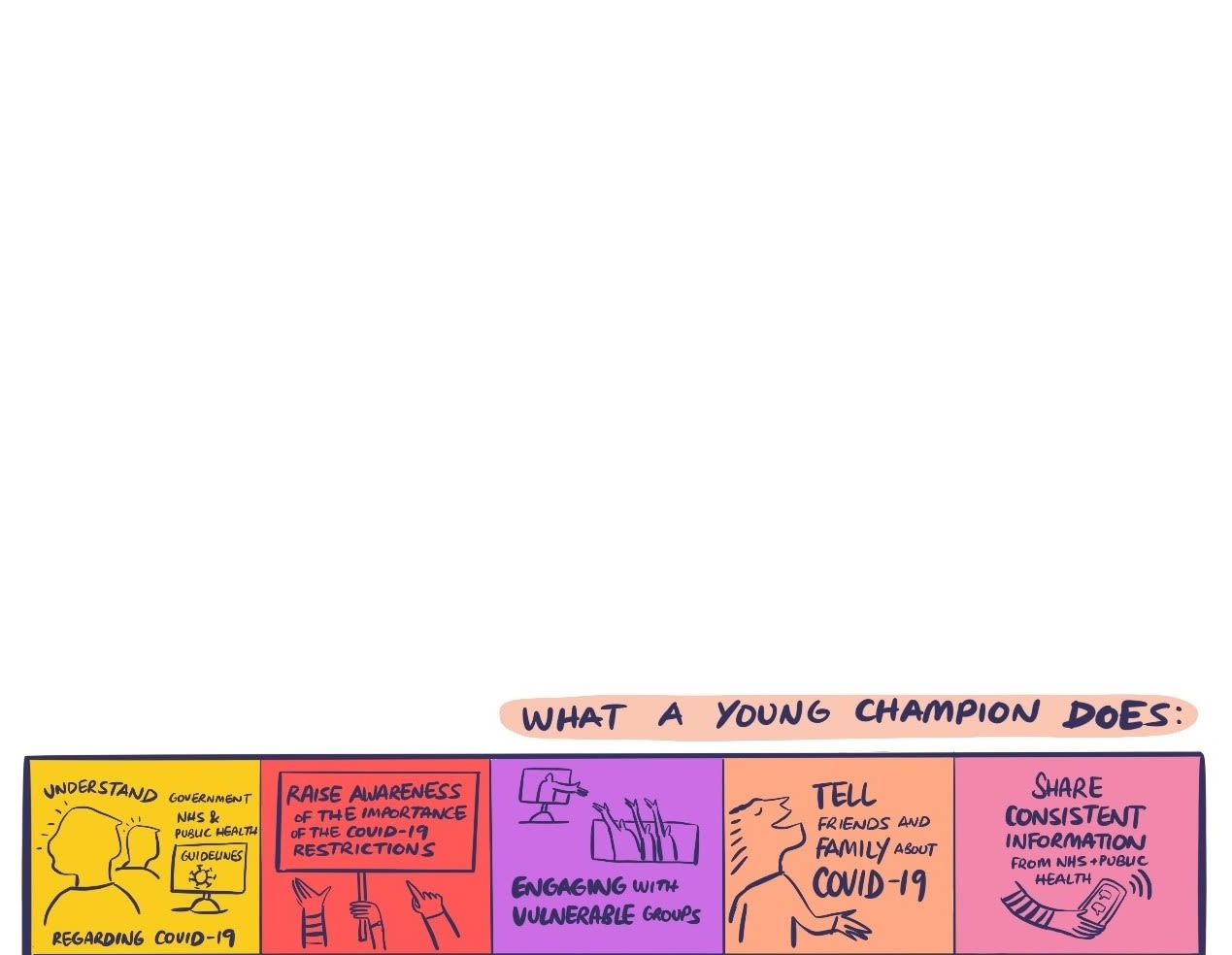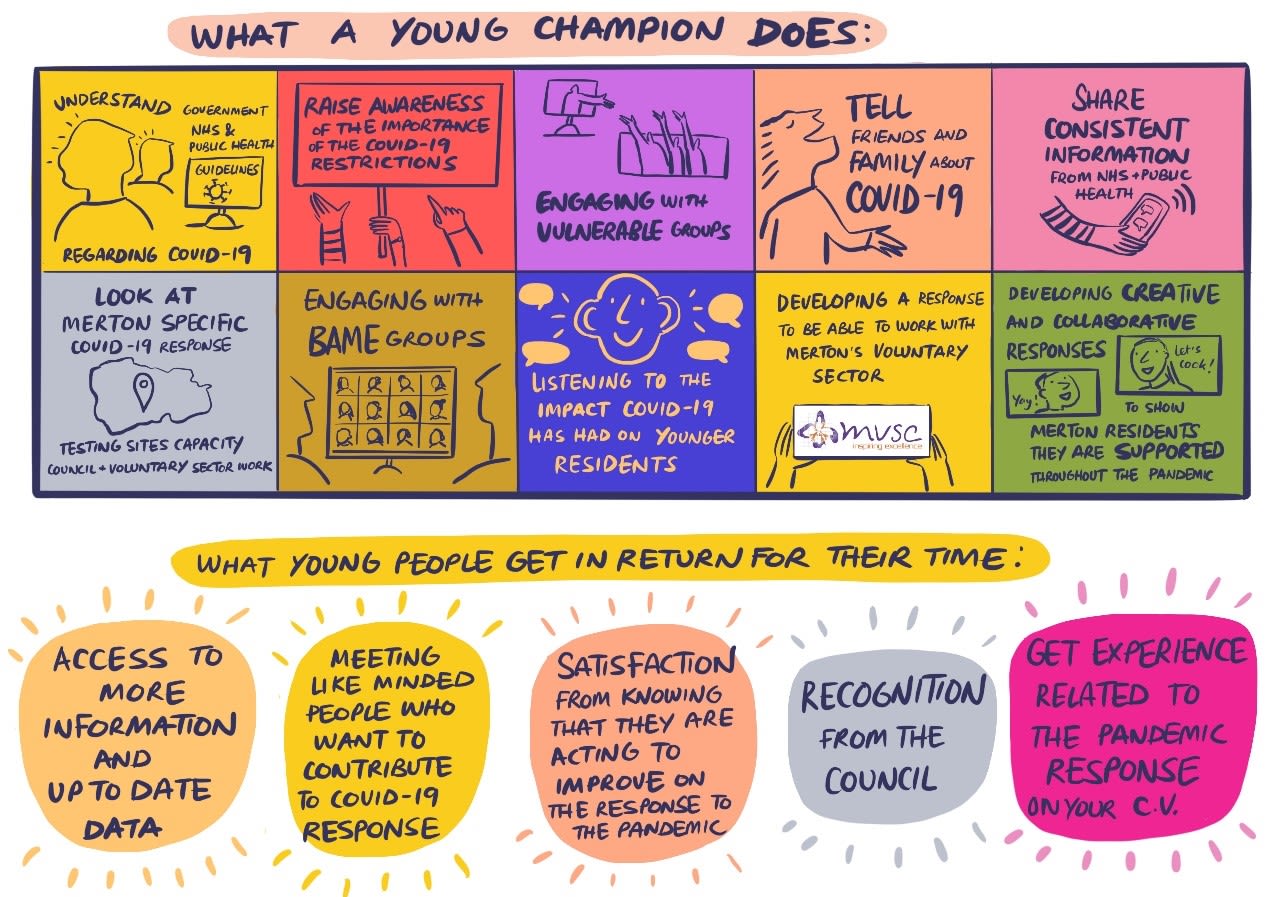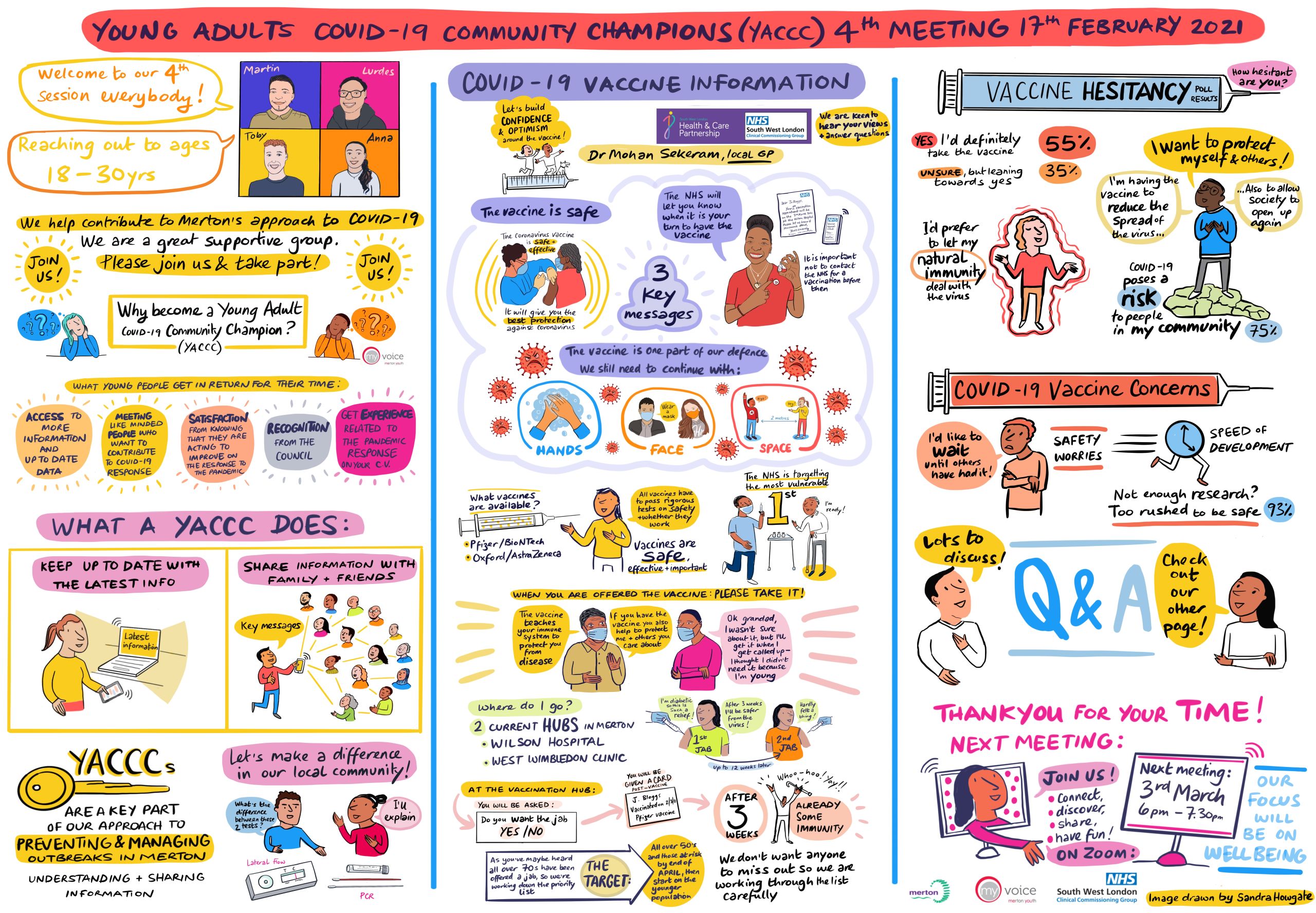Young Adult COVID-19 Community Champions
How young people in Merton are engaged with pandemic data and community action

An innovative Merton Council initiative aims to empower 18- to 30-year-olds by helping them to understand and shape local pandemic responses.
The Young Adult COVID-19 Community Champions (YACCC) programme is run “by young people for young people” by a group of young inspectors who provide input into the council’s services.
Programme participants gain up-to-date public health information presented through engaging images, videos and posters to share with their families and friends.
Young Inspectors Martin Miranda Antelo, Lurdes Moreno, Toby Podger-Taylor and Anna Huk have also been involved in other Merton Council initiatives.
These initiatives include co-producing the Children and Young People’s Plan 2019-2023, involvement in Merton Youth Health, which aimed to make young people feel more comfortable using GP services through recommending adjustments, and early intervention projects for young people in anti-social behaviour hotspots.

Young Inspector Martin Miranda Antelo pushed Merton Council to start the YACCC scheme in response to surging COVID-19 case numbers among young people last year, which also made them subject to critical media coverage.
Miranda Antelo, 25, became the youngest member of the council's health and well-being board, alongside doctors, the director of public health and several voluntary organisations.
Miranda Antelo suffered from a COVID-like illness for two weeks in March 2020 when testing was not widely available and found it difficult to find the support and information he needed.
"What it highlighted for me was that there needs to be very efficient messaging and clear rules as to what you should do," Miranda Antelo told South West Londoner.
He asked the board what the council was doing to engage young adults if they knew they had a higher risk of contracting COVID-19.
"The reason this is happening is the type of jobs young adults have, like they're in supermarkets, they're in hospitality, they're at university," Miranda Antelo said.
"They've not yet reached the point where they can work from home.
"Rather than blame them, if we know this group has been affected most, why are we not engaging them?"

The YACCC programme creates a platform for participants to voice their opinions and concerns about how COVID-19 has affected them, said Martin Miranda Antelo.
It also highlights the information channels available for young adults, including how to contact people specifically employed to help.
Free monthly Zoom workshops address pandemic-related topics such as mental health and wellbeing impacts, reasons for vaccine hesitancy, testing site locations and relevant health data, informed by participant polls and discussions.
A distinctive communications strategy sees the workshops’ proceedings colourfully live-scribed by illustrator Sandra Howgate, who also creates graphic designs used to advertise the programme.
Miranda Antelo said: “We always understood that we had to do something different because we were engaging a group that the council has traditionally struggled with.
“We hired a live-scriber and when we saw the end product, we were like this is amazing, because we don’t have to read the minutes, like five pages long with eleven size font."
“You’ve got actual images, because images can say so many things more than words.
“The quality of it was really good, so we were very proud of it.”
The group challenges people’s stereotypes of what interests young people in a creative way, Miranda Antelo said.
“We saw this opportunity to engage a lot of people that are interested in specific data and we found that a lot of them were quite interested in health and health services in general.
“We spoke about testing based on their responses and then we started touching upon vaccination based on their responses, so there is that type of engagement with the Zoom meetings.”
More than 25 people joined an online Q&A in February 2021 with local GP Mohan Sekeram, who answered questions about COVID-19 vaccines.
Fascinating and wonderful discussion around #covid #vaccination uptake for younger cohort in #merton . Thanks for opportunity and pleased to see final poll . Pleasure 🙏🏾 . Plenty more to do ☝🏾@UsaamaK @MartinWhelton @barry_causer https://t.co/NOHwBmqcGf pic.twitter.com/cA9Wfgtr1C
— Mohan sekeram (@SekeramMohan) February 17, 2021
Polls are used during the sessions to check whether the information being covered is useful and relevant.
The sessions offer a unique opportunity for individual conversations about confusing and contentious topics between young people and groups such as Public Health and the Clinical Commissioning Group.
Stereotypes held by both sides are addressed through this dynamic, said Miranda Antelo.
“You can see a group of five people that look the same and hang out with each other, but their personalities are completely different.
“People are stereotyping you […] and then you’re like I’m in this group, but I’m getting grilled for things I haven’t done […] it’s not really fair.
“So it’s always important to make sure we are having individual conversations when we’re talking about vaccine hesitancy or stuff like that because at the end of the day the individual has to make that decision.”

Young adults aged 18 to 30 have been uniquely and seriously impacted by the pandemic, due to obstacles to their employment prospects and wider development.
A separate programme for under 18s addresses the challenges for this age group, also run by Young Inspectors.
However, Miranda Antelo pushed for the YACCC programme to involve 18-to-30-year-olds in particular, noting their lack of engagement in the council's Community Champions scheme for all age groups and the different challenges they face to children and teenagers at school, for whom more funding is available.
"I said, no, forget the funding - this is about reaching real people," Miranda Antelo said.
"It's [...] affected their development as people in general, like I think there's a lot of people [who] haven't had a first job.
"How are we going to get them to be in a sustainable position where they can just continuously develop?
"That's something I see as a challenge right now.
"I think we just need to be very transparent and let people know, it's not your fault you couldn't get your first job."
Beyond COVID-19, Martin Miranda Antelo hopes the YACCC group will be the start of a continuing network connecting young adults in Merton and allowing more opportunities for input into local political processes.
“The main thing isn’t that we want people to come to our session, the main thing is that we want young people to get empowered and then be able to make those changes," said Miranda Antelo.
“We want to continue to increase the engagement that we have between young adults in Merton and groups like the Clinical Commissioning Group and Public Health who are very interested in the opinions of young people.
“We just want to create a network of young adult residents so that they can find the information they need, but also that they can find individuals to connect with.
“It is about people networking and meeting people who are like-minded, who are interested in trying to create positive things.
“I would want this to be mirrored in every council if I could because I know there’s a lot of young people who are very passionate about these things, but because the opportunities are not there, you’re just missing out on a lot of engagement that is very valuable.”
"I just think we need to get more young voices heard in political processes in general and we need to really empower young people to put themselves to go to meetings, to speak.
"Find the right people, like the leaders, the people that are like moving and shaking things because a lot of things need to be shaken, like they just need a real shake."
Worried about life after lockdown and easing back into socialisation?
— Merton Council (@Merton_Council) April 24, 2021
Join our next #MertonYACCC session on 28 April to discuss life going forward now restrictions are being lifted and how we can cope with socialisation.
Register your place now!👇 https://t.co/oAnhjvVXyY pic.twitter.com/PLXbY9CFti
Managing the transition out of lockdown will be the focus of the next YACCC sessions.
"We do want to have a session for people to plan and be optimistic," Miranda Antelo said.
“What we were thinking about this is: how can we get you to plan your activities but also at the same time make you aware that we’re still in a pandemic?
“So it’s not that the government has said you can go out now, that doesn’t then mean that you stop wearing a mask, social distancing or washing your hands.
“It means yes, you’re allowed the privilege to go out again, but also you still have the responsibility to continue to uphold the things you need to do to keep other people safe."
“So there’s a very fine line with telling people, yes, let’s plan, but let’s still be careful.”
The next YACCC Zoom workshop will be held on 28 April at 6pm. Registration is open for free here.
Further information about the YACCC programme is available on the Merton Council website.
Images provided with permission from Merton Council.
